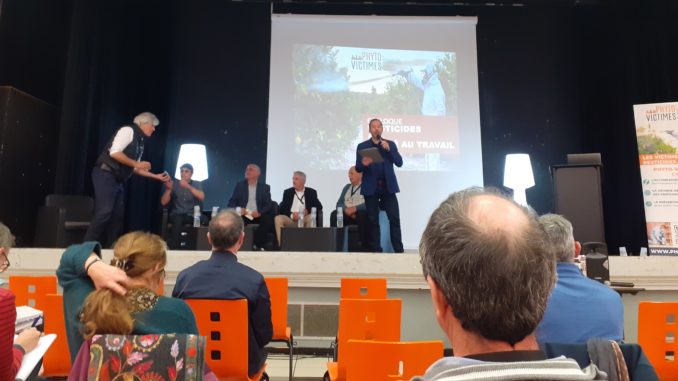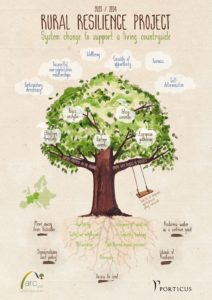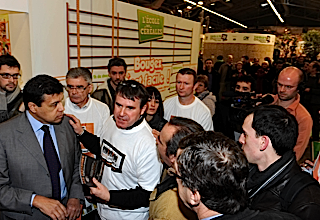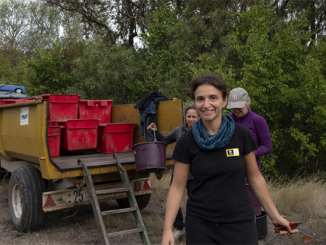
By the Rural Resilience project team
In the first phase of the Rural Resilience project (known as “Nos Campagnes en Résilience” from 2020-2022), we connected with people all over France who are engaged in experiments in socio-ecological transition. In 2023-2024, the project zooms out from France to take in the wider Europe, with a special focus on Germany (the other big country in Europe). Through the lens of multi-tiered rural policies, we are working with actors in territories across Europe to bring forward reality-based proposals, rooted in actions that are already underway on the ground.
One part of this is networking on the ground; the other is bridging the experiences of actors on the ground with policy developments in Brussels. In the first few months of the year we’ve been busy attending events to maintain ties with existing partners and grow new connections, around issues making sense on both sides of the Rhine. Here’s a quick overview of where we’ve been and who we’ve met. Report by the Rural Resilience project team.
Checking in with national actors in France
Staying true to the French roots of the project, one of our first outings this year was to the quintessential event in the French farming calendar: Salon International de l’Agriculture. We were there on 25 February, and again on 2 March. This mega-event brings together farmers on the ground and actors at national level. Dominated by the agro-industry, SIA draws a lot of criticism – not least from ARC2020 policy analyst Matteo Metta. One criticism, that of the poor gender representation, was addressed by a counter-event on 4 March – Salon des agricultrices – and of course Rural Resilience project coordinator Marie-Lise Breure-Montagne was there! Special attention was paid to the pesticide exposure of West Indian populations and agricultural workers, with the case of chlordecone, a banana insecticide with high persistence in the environment.
Another opportunity to check in with the big players on the French stage: an ecosystem of national actors is behind the publication of Déméter 2023, an annual publication for agriculture and food policy, with some insights on sustainability issues such as the Dutch nitrate plan. We attended the online launch on 16 February.
Public health & pesticides
Pesticides are a key focus area for the Rural Resilience project, since the wellbeing of rural populations is doubly at risk: due to exposure to chemical pesticides, and difficulties of access to healthcare. Even as the proliferation of pesticides in drinking water is exposed in France, the push back continues at EU level of the proposed Sustainable Use of Pesticides Regulation (SUR), which aims to reduce the use and risks of pesticides and protect sensitive areas and human health.
On March 21, we discovered the latest French research at a conference on “European Chemical Pesticide-free Agriculture in 2050”. Organised by INRAE (French research institute for agriculture, food and environment), the conference presented the results of a foresight study on European Pesticide Free Agriculture in 2050 (linked to Farm to Fork strategy), which was conducted under of the French national Priority Research Programme “Growing and Protecting Crops Differently” led by INRAE (and partnership with its German counterparts ZALF and JKI).
These insights from France were complemented by learnings from Czech R&D on alternatives to pesticides, as presented at the Living Farming Symposium in Prague on March 3.
Not to forget the very real impact of pesticides on health and safety in the workplace: on April 22, we were in Le Mans in North-West France to learn more from victims on the frontlines. The symposium “Pesticides & Occupational Health & Safety: What Says the Science in 2023?” was organised by Association Phyto-Victimes, a non-profit that supports workers whose health has suffered due to exposure to pesticides. Presentations of the latest scientific research into the impact of pesticides on human health were followed by a round table discussion on the need for a group to give voice to the victims of pesticides.
Because the health of rural populations is a cornerstone of building rural resilience, territories will need to adapt to the public health consequences of living with climate change. During a webinar organised by Observatoire Régional de Santé (Regional Health Observatory) on March 30, we had the opportunity to learn more about a specific case study: the response of French territories to the arrival of the disease-carrying tiger mosquito (Aedes albopictus), which now affects 70% of the départements in France.
Watch this space for our forthcoming policy analysis on rural wellbeing and the move away from pesticides!
Feeding Ourselves 2023 – Building Bridges for Rural Resilience
Democratising food systems
Building on the work of the Rural Resilience project so far, food has emerged as a key factor for resilience in the European countryside. Specifically, we are now looking at possibilities to keep food systems in the hands of local communities. And so we welcomed a high-level event hosted on 7 March by European Coordination Via Campesina (ECVC): “More Farms Across Europe: A Road Map for the Re-Territorialisation of European Food Systems.” The European Commissioner for Agriculture and Rural Development Janusz Wojciechowski, MEP Maria Noichl (S&D), MEP Isabel Carvalhais (S&D) and MEP Benoît Biteau (Greens), as well as farmer members of ECVC and members of the European Economic and Social Committee (EESC), came together to discuss how increasing the number of farms in Europe can help achieve the objectives set out in the European Green Deal and especially the Farm To Fork Strategy.
On March 25-26, a delegation from ARC2020 was in Cloughjordan, Ireland to participate in Feeding Ourselves 2023. The Rural Resilience project was very happy to support this annual gathering of actors working on questions around food systems and system change, wellbeing in rural areas, and farm diversification – all topics close to this project’s heart. We were joined remotely by our project partners in Plessé, France, who gave a presentation on their Local Food and Agricultural Policy (PAAC). The voices from the field in attendance were in turn picked up by Brussels media. ARC2020’s Seeds4All project hosted a plant dye workshop during the Feeding Ourselves weekend, and was on the ground in Ireland to explore agrobiodiversity as a key driver for rural revolution.
The Rural Resilience project was delighted to support the Global Bean Seed Festival on April 22. Project partner Xavier Hamon, set the tone for the event with a call to take back the power over our food systems. As an artisan-cook with farming roots, Xavier sees the potential of food producers coming together and reconnecting with the living world to build resilience. The online bean fest was complemented by a real-life gathering of bean lovers and rural actors in Castelnaudary in the South of France organised by ARC2020’s Seeds4All project together with partners on the ground, in partnership with the Rural Resilience project.
Rural Pact, “framework of cooperation”: how many or how much?
On the European policy stage, we checked in with the Rural Pact, an initiative that ARC2020 has been critical of since its launch last summer. On 12 April, we participated in an online workshop, “The Rural Pact: updates and open issues”, organised by the University of Pisa, in partnership with the European Association for Innovation in Local Development (AEIDL).
On this “long term vision” for European rural areas, what to say: 10 common goals for 2040; 4 building blocks (one of the four is resilience, mixed up with other “business as usual” blocks). Our feeling is that this rural-proofing approach at different policy levels is quite ‘qualitative’. There is a big push for stakeholders to join the Rural Pact Community with a view to becoming “a network of networks” for policymakers (“rural Linkedin”). Our take: the Rural Pact seems to be an attempt to balance the verticality of EU policies with more horizontality, with urban-rural cooperation perhaps beyond the scope of the framework. However, innovative initiatives are unlikely to find new opportunities for much more financial support, within this Rural Pact Initiative.
Coming up in our summer diary: The Desirable Ruralities conference, a symposium on sustainable territories and one health, the launch of the network of Territorial Food Programmes (see our policy analysis on local food policy), and the launch of a report by Terre de Liens on ownership of farmland in France.
Access to land is the subject of a forthcoming policy analysis by the Rural Resilience project.
More on Rural Resilience
France | Democratising Food Policy – Tweaking The Financial Toolbox
Rural Realities | Succession – Passing It (All) On To The Next Generation
Cultivating The Future Together – ARC’s Rural Resilience Gathering in France
France | Meet The Farmer-Bakers Proving Their Skills – part 2
Cross-Pollinating Resilience From Portugal: Nos Campagnes en Resilience in Plessé
Feeding Ourselves 2023 – Building Bridges for Rural Resilience





